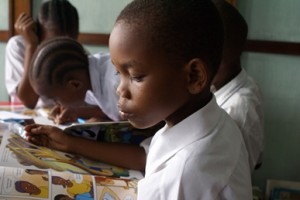The IBBY-Asahi Reading Promotion Award is given every two years to two projects and presented to the winners at the biennial IBBY Congress. Each nominated project is targeted to children who live in disadvantageous circumstances with no or little access to books.
The two winners for 2012 are Abuelas Cuentacuentos – The Grandmother Storytelling Programme, Argentina and SIPAR, Cambodia.
SIPAR began as a Franco/Cambodian association in 1982 to help Cambodian refugees living on the Cambodian/Thai border during the Khmer Rouge regime. When the government fell, SIPAR helped to rebuild the educational network and by 1993 was focussing its activities on reading including organizing libraries all over Cambodia and setting up rural reading centres. From 1993 to 2011 more than 1,000 librarians were trained in the SIPAR workshops. Recently the Cambodian Ministry of Education has taken over the network.
By 2000 it was very noticeable that there were no Cambodian children’s books in the libraries and the SIPAR staff were translating the donated foreign books and sticking the texts in Khmer in the books. During the regime of the Khmer Rouge all books had been destroyed and the creators had been killed. There were no publishing houses left in the country. In 2000, SIPAR started running training workshops for publishing, writing and illustration, mostly for children’s books. Today SIPAR has a small publishing department that is run by Cambodians. They have published 70 titles, and printed 130,000 free copies for the 200 SIPAR libraries and the students at the teacher training colleges for primary schools.
The IBBY Jury was impressed by the work done over the last twenty years as well as by the long-term training aspect of SIPAR that will build a book culture and thus answer a very big need for literacy in Cambodia. The work is sustainable and able to bring local language books to Cambodia.
Abuelas Cuentacuentos – The Grandmother’s Storytelling Programme in Argentina is organized by the Mempo Giardinelli Foundation (FMG) and engages older persons who like to read stories to children. Specialized personnel at the Foundation train volunteers and organize programmes in many schools in the metropolitan area of the city of Resistencia the capital and largest city in the province of Chaco, in northeastern Argentina.
This programme promotes reading, while at the same time it takes literature to thousands of the poorest children, many of them living in marginal communities. Abuelas Cuentacuentos has created opportunities for exchanges across generations, thus is not only beneficial to the children, but also has an important impact on the self-esteem of the grandmothers. The volunteers, mainly unemployed women between the ages of 50 and 70, have found that this programme is a new and productive way of using their time and their capacity to give affection through their new role of storyteller.
The project impressed the IBBY jury by its simple and original approach to reading promotion. The programme is easy to replicate and is sustainable over a long period. The promotion of intergeneration interaction is another aspect that gives it effective and emotional dimensions that are beneficial to both the children and the grandmothers.
Congratulations to these excellent two projects.
